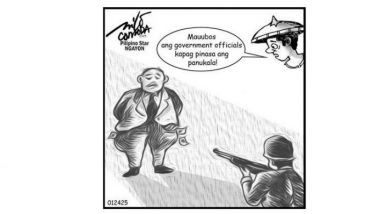Trader: I supplied P46-M bugging devices to PNP
December 25, 2000 | 12:00am
A Filipino businessman claimed yesterday to be the supplier who delivered some P46 million worth of sophisticated bugging equipment to the Philippine National Police (PNP).
Debunking official police claims that Camp Crame did not purchase multimillion-peso bugging equipment, the businessman told The STAR that he was prepared to face the Senate to shed light on the controversy.
The businessman requested anonymity until he has been given protection by authorities.
The controversy began when Camp Crame reporters last week uncovered documents showing that the national police had purchased electronic surveillance equipment three months ago.
The exposé came as the Senate impeachment court trying President Estrada conducted hearings to probe allegations that the Presidential Anti-Organized Crime Task Force (PAOCTF) was bugging officers of the impeachment court and other public figures, including journalists.
PNP chief and PAOCTF head Director General Panfilo Lacson denied ordering surveillance operations on officers of the impeachment tribunal and blamed a telephone company employee for leaking confidential telephone call records to reporters.
Lacson even vowed to disband the PAOCTF once it is proven that it has been monitoring the movements of opposition leaders, congressmen and newsmen.
"If any of my people committed the acts as described in the newspapers, then I think I would have lost effective control over the task force and there is no reason to remain there a minute longer," Lacson had told reporters.
At the same time, PNP spokesman Senior Superintendent Nicolas Bartolome denied that the police had acquired the sophisticated bugging equipment.
However, the businessman, a long-time supplier of military and police equipment belied Bartolome’s statement and claimed that he had indeed delivered the P46-million bugging arsenal to the PNP.
"It is no longer my responsibility if these equipment are used by the police illegally," he said. "I am a businessman and I deal with them professionally," said the supplier.
"For the sake of the country, I am willing to testify before the Senate about the bugging devices," the supplier told The STAR.
The supplier claims he has provided equipment both to the Armed Forces and the police, including helicopter gunships.
He said the German-made G-900 tracking device he delivered to the PNP three months ago was originally intended for the PNP Special Action Force but is now with the PAOCTF.
The G-900 tracking device can monitor 500 simultaneous conversations made through cellular phones, the supplier added.
The documents obtained by reporters last week revealed that aside from the G-900 device, the PNP had acquired a cellular interceptor and digital mapping system, jamming transmitter, telephone scramblers, three radio direction finders, five audio monitoring devices, two three-channel wire listening devices, speech processor, two transceiver bugging devices each worth P300,000, monitoring system and 32-channel pager monitoring system worth P6 million.
Bartolome, however, dismissed the document as "spurious."
"It (the papers) did not come from us and anybody can just produce the pieces of paper," Bartolome said.
Lacson, for his part, denied that the PNP was involved in any electronic surveillance on any officer of the impeachment court.
He instead testified that a Philippine Long Distance Telephone Co. (PLDT) employee helped a crack police intelligence officer monitor the calls made by senator-judges and prosecutors in the ongoing impeachment trial.
The PNP chief identified the PLDT employee as Flodina Pasamba, who supposedly turned over the printouts to the police intelligence officer, whom Lacson did not identify.
Police sources, however, identified the officer as Superintendent Rodolfo "Boogie" Mendoza, acknowledged by law enforcers as a crack intelligence officer currently assigned with the PNP Center for Transnational Crime.
Mendoza had likewise expressed willingness to testify before the Senate to elaborate on the capability of the PNP and the PAOCTF to occasionally conduct surveillance operations on different personalities apart from crime-related operations. He did not elaborate.
While Lacson did not name Mendoza directly, he said a police officer turned over the illegal documents to Surigao Rep. Robert Ace Barbers, who in turn leaked the document to media.
In a related development, Sen. Juan Ponce Enrile, who was among those reported to be under electronic surveillance, said that the phone number that was supposed to have been bugged had already been changed and that it was already deleted from the telephone directory.
"The numbers in the confidential list date back to several decades," Enrile said in a radio program which he co-hosts with Sen. Juan Flavier.
However, Flavier confirmed an entry in the confidential list that showed that he made calls from his office at 5:45 p.m. everyday but doubted that the listener learned much.
"I really made those calls every day," Flavier said, adding that the number was his home number. "I had to ask what’s for dinner." - With Perseus Echeminada
Debunking official police claims that Camp Crame did not purchase multimillion-peso bugging equipment, the businessman told The STAR that he was prepared to face the Senate to shed light on the controversy.
The businessman requested anonymity until he has been given protection by authorities.
The controversy began when Camp Crame reporters last week uncovered documents showing that the national police had purchased electronic surveillance equipment three months ago.
The exposé came as the Senate impeachment court trying President Estrada conducted hearings to probe allegations that the Presidential Anti-Organized Crime Task Force (PAOCTF) was bugging officers of the impeachment court and other public figures, including journalists.
PNP chief and PAOCTF head Director General Panfilo Lacson denied ordering surveillance operations on officers of the impeachment tribunal and blamed a telephone company employee for leaking confidential telephone call records to reporters.
Lacson even vowed to disband the PAOCTF once it is proven that it has been monitoring the movements of opposition leaders, congressmen and newsmen.
"If any of my people committed the acts as described in the newspapers, then I think I would have lost effective control over the task force and there is no reason to remain there a minute longer," Lacson had told reporters.
At the same time, PNP spokesman Senior Superintendent Nicolas Bartolome denied that the police had acquired the sophisticated bugging equipment.
However, the businessman, a long-time supplier of military and police equipment belied Bartolome’s statement and claimed that he had indeed delivered the P46-million bugging arsenal to the PNP.
"It is no longer my responsibility if these equipment are used by the police illegally," he said. "I am a businessman and I deal with them professionally," said the supplier.
"For the sake of the country, I am willing to testify before the Senate about the bugging devices," the supplier told The STAR.
The supplier claims he has provided equipment both to the Armed Forces and the police, including helicopter gunships.
He said the German-made G-900 tracking device he delivered to the PNP three months ago was originally intended for the PNP Special Action Force but is now with the PAOCTF.
The G-900 tracking device can monitor 500 simultaneous conversations made through cellular phones, the supplier added.
The documents obtained by reporters last week revealed that aside from the G-900 device, the PNP had acquired a cellular interceptor and digital mapping system, jamming transmitter, telephone scramblers, three radio direction finders, five audio monitoring devices, two three-channel wire listening devices, speech processor, two transceiver bugging devices each worth P300,000, monitoring system and 32-channel pager monitoring system worth P6 million.
Bartolome, however, dismissed the document as "spurious."
"It (the papers) did not come from us and anybody can just produce the pieces of paper," Bartolome said.
Lacson, for his part, denied that the PNP was involved in any electronic surveillance on any officer of the impeachment court.
He instead testified that a Philippine Long Distance Telephone Co. (PLDT) employee helped a crack police intelligence officer monitor the calls made by senator-judges and prosecutors in the ongoing impeachment trial.
The PNP chief identified the PLDT employee as Flodina Pasamba, who supposedly turned over the printouts to the police intelligence officer, whom Lacson did not identify.
Police sources, however, identified the officer as Superintendent Rodolfo "Boogie" Mendoza, acknowledged by law enforcers as a crack intelligence officer currently assigned with the PNP Center for Transnational Crime.
Mendoza had likewise expressed willingness to testify before the Senate to elaborate on the capability of the PNP and the PAOCTF to occasionally conduct surveillance operations on different personalities apart from crime-related operations. He did not elaborate.
While Lacson did not name Mendoza directly, he said a police officer turned over the illegal documents to Surigao Rep. Robert Ace Barbers, who in turn leaked the document to media.
In a related development, Sen. Juan Ponce Enrile, who was among those reported to be under electronic surveillance, said that the phone number that was supposed to have been bugged had already been changed and that it was already deleted from the telephone directory.
"The numbers in the confidential list date back to several decades," Enrile said in a radio program which he co-hosts with Sen. Juan Flavier.
However, Flavier confirmed an entry in the confidential list that showed that he made calls from his office at 5:45 p.m. everyday but doubted that the listener learned much.
"I really made those calls every day," Flavier said, adding that the number was his home number. "I had to ask what’s for dinner." - With Perseus Echeminada
BrandSpace Articles
<
>
- Latest
- Trending
Trending
Latest
Trending
Latest
Recommended





























